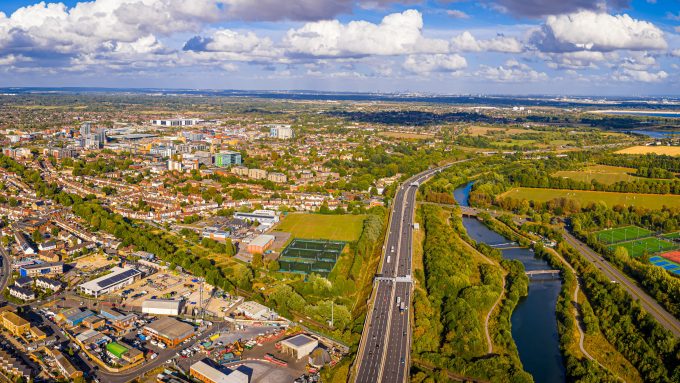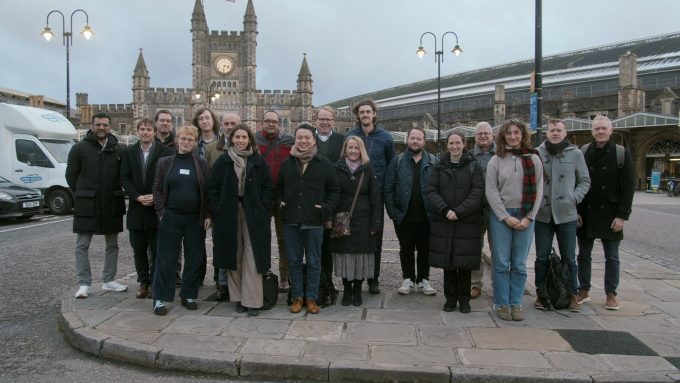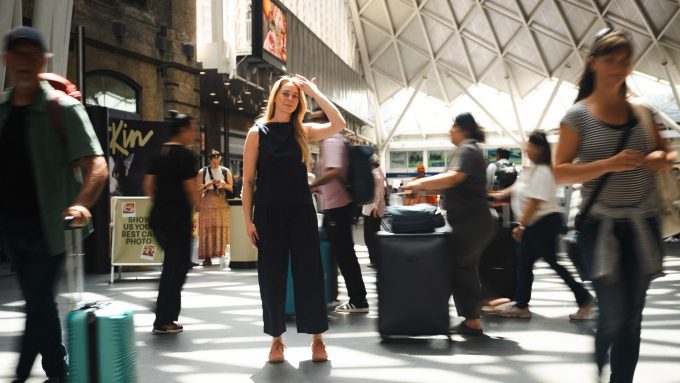
Meet the innovator cleaning the air in train stations

“Sometimes you can literally taste pollution in the air,” remarks industrial product designer and entrepreneur Matteo Maccario. “Once you know it is there – and exactly what you are breathing in – it’s hard to ignore.”
Matteo and colleagues from start-up company Pluvo have developed an air purification device for use in large public spaces, known as the ‘Pluvo Column’, and is about to install its first units on two railway station platforms: a couple at Birmingham New Street and one at Salisbury station in Wiltshire.
The company has been supported by Connected Places Catapult on two recent accelerator programmes: one focused on Intelligent Mobility in association with innovation agency Wayra UK and another set around Milton Keynes. It has also been part of an SME engagement programme and network with the Catapult.
The Pluvo Column features a three stage filtration system to remove airborne pollutants including exhaust gases – such as nitrous and sulphur oxides – and particulate matter. Air is sucked in from the base of the unit, filtered and released back into the local environment above head height. The units can operate either to a pre-determined schedule, or start working when air quality monitors housed inside the unit detect that levels of pollutants have reached a threshold.
“We are confident that the devices can have a significant impact on air pollution within a radius of 25 metres or greater,” Matteo says. “And as you get closer to around 13 metres, levels of particulate matter have been found to reduce by about two thirds.
“For the trials in Birmingham and Salisbury we are targeting areas with seating where people are waiting for trains, in order to create cleaner air zones, as both stations see a fair amount of diesel trains passing through. But the devices could also help station managers to better understand the impact that certain trains can have on air pollution; highlighting the times of day when spikes in pollution are being seen – and for how long.”Matteo Maccario, CEO, Pluvo
Aiming for form, function and return
Matteo developed the air filtration device alongside company co-founder Rikesh Chotai after graduating from a double Masters in innovation design and engineering with Imperial College London and the Royal College of Art.
Their aim was to develop a system that not only improves air quality, but looks attractive in an urban setting – and can generate revenue.
Matteo and his team researched and tested a series of existing filtration technologies – most of which were designed either for small enclosed spaces like homes, or larger industrial processes – and refined them for use in public settings.
They set about designing infrastructure to house the purifier and came up with a 2.7 metre high ‘totem’ which has an elliptical form and no sharp corners. “We were very focused on how the column should look. The fact it is an elliptical shape makes the engineering a bit more difficult, but we were keen to maintain the aesthetic,” Matteo says.
Each totem features advertising screens on two sides as a mechanism to help pay the running costs and generate income. Static advertisements will be displayed for the initial station trial sites, but digital LED screens are planned for future iterations of the device.
Matteo adds that if the units prove to be a commercial success, they may incentivise clients to install more of them; helping to clean even more of the air at railway stations.

Pivoting from streets to stations
Pluvo’s original plan was to install air purification devices alongside busy roads and in town centres. Trials took place beside the North Circular Road in London but when it came to permanent installations, council planning processes proved slow and unpredictable. Matteo decided to pivot towards transport hubs and the rail environment and partnered with Network Rail (which manages Birmingham New Street) and South Western Railway (which looks after Salisbury) to trial the Pluvo Column.
The company realised that the device’s impact may be even greater at stations than beside streets because the units can be placed at pollution hotspots, close to where many people gather and wait.
Matteo adds that the devices could work equally as well in other transport hubs, such as metro stations, inside multistorey carparks and beside pick-up and drop-off zones at airports.
Placing clean air devices prominently in public spaces could also help to raise the importance of clean air among the public, Matteo suggests – especially if the messaging of the brands being advertised on the side of the units has an environmental theme. “Everyone talks about sustainability and the need to limit climate change, but unfortunately the threat of air pollution to human health doesn’t get as much attention. The more people can become educated about the importance of clean air, the more chance we have of seeing legislation introduced to help reduce the problem.”
Pluvo’s participation in the Intelligent Mobility accelerator with Connected Places Catapult and subsequent showcase day led to discussions with rail industry representatives, including an innovation manager working for South Western Railway which resulted in the Salisbury trial.
“The Catapult made several important connections for us, including with Guy’s and St Thomas’ Hospital in London which carries out air quality research,” Matteo says. “We were also invited along to various events such as rail investor days, and have been kept in the loop when opportunities arise.”Matteo Maccario, CEO, Pluvo
Early Years
Matteo Maccario was born in Nashville, Tennessee to Italian parents and the family moved to Canada when he was 11. As a child, he remembers wanting to be an inventor and took a keen interest in the environment and nature.
His father was an engineer “which probably influenced my career” and Matteo enrolled on a mechanical engineering degree at Western University before spending four years of his early career at a heavy machinery firm involved in fabrication and assembly.
He later worked as a lean business consultant, and participated in a climate impact and entrepreneurship programme with the European Institute of Innovation and Technology. He also enrolled on a circular economy fellowship programme with the Ellen MacArthur Foundation, led by the former sailor.
In 2016 he enrolled on the double Masters course with Imperial and the Royal College, which gave him an appreciation of how engineering and design can come together. Five years ago, Matteo co-founded Pluvo. The team outsources the manufacturing of the new devices in the UK, but for now Pluvo assembles the units itself. “I enjoy getting hands on; it’s important to physically feel the joy or pain of how the design comes together,” says Matteo.
“Our primary focus with the units is functionality, but we also consider the sustainability of the materials we use, their embedded carbon and whether our units can be easily updated, upcycled or reused, rather than ending up in landfill in some distant future.
“The start of our journey has been full of learnings,” he adds. “We are still in our early days, but have investors on board and are looking to raise £1 million to help with our expansion,” he says. “I’ve been fortunate to work on many interesting projects, but this has been the most exciting journey yet.”
Matteo also joined us on a previous episode of the Connected Places podcast - listen below.





